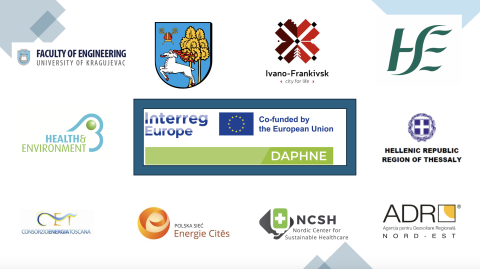Project summary
Healthcare is a hugely energy-intensive sector
- It contributes 5% of global greenhouse gas (GHG) emissions and has a carbon footprint equivalent to 514 coal-fired power plants.
- Over 50% of its footprint is attributable to energy use, primarily consumption of electricity, gas, steam and air conditioning, with other operational emissions. Other contributing activities include: agriculture (9% e.g. catering at health facilities, growing cotton for surgical gowns), pharmaceuticals & chemicals (5%), transport (7%) and waste treatment (3%).
- There are ca. 15,000 hospitals in the EU, accounting for 25% to 60% of health expenditure (average 9.9% of EU member states’ GDP).
The decarbonisation of the healthcare sector can no longer be postponed
10 organisations from 7 EU countries, including support of an Advisory partner (Italy, Romania, Belgium, Greece, Ireland, Poland and Sweden) and public structures from 2 EU candidate countries (Serbia and Ukraine), started a collaboration to enhance the capacity of 6 national/regional/local authorities for designing and implementing better policies to decarbonize the healthcare sector.
By fostering uptake of an integrated approach, DAPHNE boosts the design and implementation of high-impact actions (power supply, renewable, facilities and operations, supply chain, waste management, etc.) all contributing to GHG emission reduction and encouraging the scaling up of innovative tools in the field. In this context and in order to achieve the overall project aim, partners cooperate at interregional level to reach the following specific objectives:
- to chart a course to decarbonization of the healthcare sector, involving multiple interventions to implement high-impact integrated actions;
- to identify latest breakthrough technologies and innovative tools that could accelerate the energy transition in the sector.
Our team:
Tuscany Energy Consortium Italy (Lead partner) - Italy
National Environment and Health Cell - Belgium
Health Service Executive - Ireland
Executive Committee of Ivano-Frankivsk City Council - Ukraine
Faculty of Engineering University of Kragujevac - Serbia
TEM at Lund University - Sweden
North-East Regional Development Agency - Romania
Region of Thessaly - Greece
Elk City Municipality - Poland
Association of Municipalities Polish Network “Energie Cités” - Poland

Check out our promotional video!
Subscribe to our You Tube channel to stay updated and watch our promotional video about the energy saving in European Hospitals!
What will this project change
Healthcare facilities are characterized by large energy needs: heating and cooling, but also need of the countless equipment, machinery, and transportation needs within the facilities. Certainly the well-being of patients must always be placed first but this IS NOT in contrast with the possibilities we have to work on energy efficiency. Daphne want to act precisely on the construction of this new paradigm: working on the well-being of patients by contributing to the well-being of the climate and the environment. In a certain sense it is about applying the One Health concept to healthcare facilities, thinking of them as a part of the ecosystem, with respect to which it is appropriate to think about all the possible areas of improvement and enhancement. This will have a positive impact on management organizations and making users feel part of an effort to improve the environment and everyone's health.